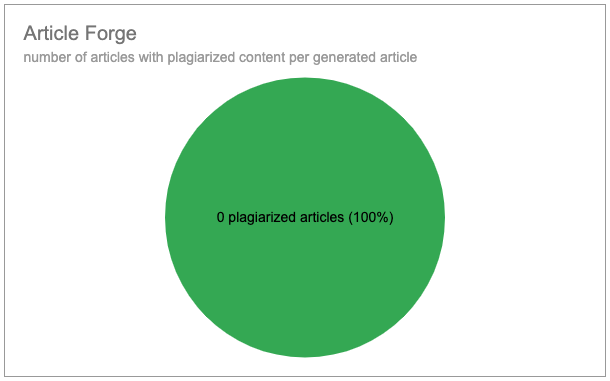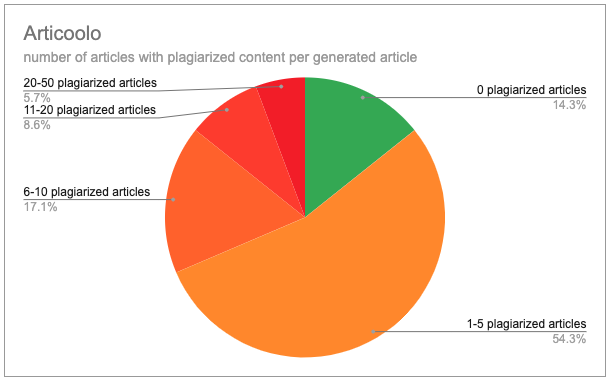Articoolo vs. Article Forge Comparison

| Tool | Content Quality (out of 5) | Uniqueness | How is Content Created? | Topic Coverage | Speed (words per second) | User Experience (out of 5) | Price |
|---|---|---|---|---|---|---|---|
| 1. Article Forge | 3.09 | 100% | AI/Deep Learning Models | 100% | 5.84 | 5 | $57/mo - unlimited articles |
| 2. Articoolo | 1.05 | 14.30% | Scraping & Spinning + AI/NLP | 50% | 4.76 words per second | 2.5 | $99/mo - 250 articles |
Introduction
For another post, we tested the top five tools in the automated content generation industry in the above categories to determine which tool is the best. You can find that post here.
While you can read that post to get a comprehensive idea about the top tools in the field, it is a pretty long read. This post compares Article Forge to Articoolo directly to give you an in-depth analysis on the above results in each category.
Methods/strategy How we set up the studies
To build our dataset, we generated articles with each tool for a list of 54 keywords. That list covered a variety of keywords ranging from broad, competitive industries to long-tail topics.
We then created and ran tests for each category in the above table (overall content quality, uniqueness, how the tools create content, speed, user experience, topic coverage, and price). Below are the results of each of the tests.
Content Quality
The quality of machine-generated content is the largest barrier preventing it from being used by everyone to help write all their content. Unfortunately, it takes more than just a handful of samples to determine the overall quality that can be expected from a given automated tool. So, we decided to run two studies on our full article dataset.
The first study (run with Mechanical Turk) simply asked participants to rate articles on a scale of 1 to 5 based on: the flow of the article, relevance to the given keyword, general readability, syntax, factual accuracy, and overall completeness of the article. Article Forge earned an average grade of 3.09/5 while Articoolo earned a 1.50/5. From our testing, anything below a score of 2.0 was unusable, scores between 2 and 3 would require major revisions before they could be used, scores between 3 and 3.5 could be used after a few edits, and scores above 3.5 would not require editing.
For the second study, participants were asked to compare two articles about a given keyword and decide which article was higher quality. In the direct comparison, participants preferred Article Forge 918% more than Articoolo.
Uniqueness
It is widely known that Google does not like duplicate content and that it can have a serious negative impact on rankings. Therefore, uniqueness is a cornerstone for creating content that can rank. To determine if Articoolo and Article Forge write unique content, we ran our article dataset through CopyScape (a tool built solely to detect duplicate content).
CopyScape determined that 100% of Article Forge articles were completely unique while only 14.3% of Articoolo articles had no plagiarized content.
Because 85% of Articoolo articles came back with duplicate content, we wanted to break down exactly how much duplicate content was found per article. Below is a chart outlining how many separate articles were plagiarized in each Articoolo article:


How the articles are made
After seeing the results of the uniqueness test, we decided to look a bit further into how the tools are creating their content to see if we could better understand why more than 85% of Articoolo’s articles had duplicate content while Article Forge’s had none. More specifically, we wanted to understand if Articoolo is using the blackhat “scraping and spinning method”.
When reading how Articoolo describes their content creation process, it is pretty obvious that they are using the scrape and spin method. While they do not directly admit to scraping and spinning, they say that their technology extracts the important content from base resources and rewrites the text to form a unique article. This combined with the fact that the articles got a very low quality score and were rarely unique heavily indicates that the articles are simply being scraped and spun.
When looking at Article Forge content, it reads and flows so naturally that it could pass as human content, which makes it pretty obvious that it was not created by scraping and spinning content. Another big clue is that their content has no duplicate content ever. The articles were rated more than twice as high as the Articoolo articles by the quality study participants. Because of this, it is clear that Article Forge is using deep learning and/or neural networks to write content.
Topic coverage (can it write about any niche)
Second only to the quality of the content itself, topic coverage is critical because if the tool cannot write about your niche or topic, then you’re better off writing the content yourself.
Fortunately, we were able to assess topic coverage with two simple tests: the first determined how many of the total keywords each tool could write about.
Article Forge was able to automatically generate articles for 100% of the keywords while Articoolo was only able to create articles for 64.8% of the total keywords (and some required changing the keywords slightly to get Articoolo to write about them).
The second test went a step further to see if the articles actually contained the keyword.
100% of Article Forge articles contained the keyword while the articles Articoolo was able to generate contained the keyword only 77.1% of the time.
By combining the results of the above two tests, you get an overall picture of the topic coverage for each article creator: Article Forge has 100% topic coverage while Articoolo only covers 50% of topics.
Speed
Our speed test includes the time it takes to set up the article and the article creation process and stops when we get to the finished article. Article Forge’s setup process is slightly faster than Articoolo’s because it takes any keywords while Articoolo requires you to enter your keywords then select a matching keyword from their suggestions. Both setups only took a fraction of the total time.
It is important to note that Articoolo does not give you the option to choose how long the article will be (the articles are usually around 450 words) while Article Forge does. So to keep the tests fair, we set Article Forge to the longest article setting to determine the maximum processing time.
The average time Articoolo took to create an article (start to finish) was 1 minute and 37 seconds. Article Forge took an average of 2 minutes 2 seconds to return an article.
There is a decent time difference between the text generators, so we also calculated the speed of words generated per second to make sure the longer articles weren’t put at an unfair disadvantage.
When comparing words per second (wps) directly, Articoolo wrote at an average rate of 4.76 wps while Article Forge wrote at an average rate of 5.84 wps.
While Articoolo delivers articles 20.6% faster than Article Forge, it writes shorter articles. So. when comparing words per second, Article Forge writes 18.8% more words per second.
Overall, Article Forge is the faster tool for a few reasons. 1) Article Forge writes more words per second, 2) Article Forge also has a bulk generator that can be used to have Article Forge generate all your articles at once, and 3) It is also important to consider that oftentimes, it takes multiple tries to get Articoolo to accept and write about a keyword. Failed attempts were not factored into processing time but did affect the total time required to get content and the overall user experience which we will get into next.
User experience/ease of use of the tool
Both Article Forge and Aricoolo have simple web-based interfaces.
Article Forge makes the article creation process very simple while also giving you control over the articles themselves. The process can be as simple as entering your keyword and clicking a single button. But you can also enter sub-keywords for more context, choose the length of your article, and automatically add titles, images, videos and links.
Article Forge also includes a bulk article generator that allows you to create multiple articles at a time and a post scheduler that allows you to automatically post articles to your WordPress blogs.
Articoolo also has a simple content creation process, however, after you enter your keyword, you have to select the closest match from their predetermined keyword list. As briefly mentioned in the speed section, oftentimes, you will have to enter each keyword multiple times in order to get Articoolo to run. Even then, articles fail to process the first time but may generate successfully after a few tries.
Both tools do offer API access and have easy to use file management systems. Finally, both automated tools can generate content in multiple languages.
Price
Article Forge offers two subscription plans: a Monthly plan which is $57/month and a Yearly plan which is $324/year. Both of these subscriptions allow you to create unlimited articles.
Articoolo has two types of plans: subscriptions plans and pay-per-article plans. The pay-per-article plans are 10 articles for $19, 50 articles for $75 and 100 articles for $99. The subscription plans are a much better value than the pay-per-article plans and range from: 30 articles for $29/month, 100 articles for $49/month, or 250 articles for $99/month.
Overall, both Article Forge and Articoolo’s subscription plans are a much better deal than the per article plans but if you need to create more than 100 articles per month, Article Forge is a better deal. Further, if you plan to automate your content generation process for the long term, Article Forge’s Yearly plan comes out to $27 per month which is cheaper than even Articoolo’s 30 article subscription plan.
Overall grade and takeaways
| Tool | Content Quality (out of 5) | Uniqueness | How is Content Created? | Topic Coverage | Speed (words per second) | User Experience (out of 5) | Price |
|---|---|---|---|---|---|---|---|
| 1. Article Forge | 3.09 | 100% | AI/Deep Learning Models | 100% | 5.84 | 5 | $57/mo - unlimited articles |
| 2. Articoolo | 1.05 | 14.30% | Scraping & Spinning + AI/NLP | 50% | 4.76 words per second | 2.5 | $99/mo - 250 articles |
Overall, we strongly recommend Article Forge over Articoolo for the following reasons:
- Article Forge’s content was rated high enough to be usable with only a few minor edits while Articoolo’s content was rated as basically unusable.
- In the side by side comparison study, participants preferred Article Forge over 900% over Articoolo.
- Article Forge content was always 100% unique while only 14.3% of Articoolo’s automatically generated articles had no duplicate content.
- Article Forge covers 100% of topics compared to Articoolo’s 50%
- Article Forge uses deep learning and other AI technology to write articles while Articoolo is scraping and spinning content (likely responsible for the large differences in quality, uniqueness, and topic coverage).
- Article Forge offers many more features than Articoolo and is much more reliable in terms of successfully creating articles on the first try.
However, Articoolo does deliver articles faster than Article Forge’s longest article setting but this advantage is lost when considering the issue of Articoolo failing to generate articles on the first try. In addition, Articoolo is cheaper if you need less than 100 articles per month.

